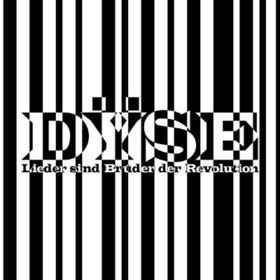
“And how does it sound? Well, if you are expecting the usual reference coordinates here and a categorization you can wait until judgement day!”
So runs the helpful press blurb attached to the promo of ‘Lieder sind bruder der revolution’, the bruisingly heavy and quizzically esoteric release from German mentalists Dyse. Actually as far as the two withheld promotional gambits go Dyse helpfully defy categorization, thus saving this humble scribe the job of trying to attach them to one, although reference points do come somewhat more readily to hand. If you recall the mid-90s, that glorious period of music where bands such as Sonic Youth, Fugazi and, most of all, Refused did a fantastic job of terrifying your granny, then you have an idea of what to expect from Dyse. Refreshingly inventive, cheerily old-school in the realm of art-rock and blistering when the mood takes them this is a band for those who enjoy their music heavy, brainy and wilfully abstruse.
Having waxed lyrical quite enough (it just so happens that Dyse are the type of band I love to discover!) what about the album? Does it live up to the twisted heritage of bands such as Refused. Well, the short answer is “hell yes!”. Opening track ‘Zebramann’ is a crushing and vaguely bewildering fusion of jazz and angular punk rock, veering from the rhythmic pulses of the verse to the chorus that foams at the mouth with frenzied screams and the occasional trumpet there is a sheen of perfection that surrounds these noisy loons that comes from years of honing their not inconsiderable skills to a razor point with which to slice the listener into giddy ribbons of noise-induced ecstasy – yes, it’s that good.
‘Festung’ joins the fray with a more straightforweard hardcore approach that Fugazi increasingly employed around their glorious ‘end hits’ period while the guitars manage to rage away satisfyingly yet with a complexity that normally siphons the power awzy from the riffs. Moreover the track somehow manages to sound like two songs in one thanks to an abrupt change in pace and stlye at the mid- point. If, for some reason, you haven’t already rushed to the shop, having heard about the first two tracks then ‘treppe’ should help to swing the deal – a stuttering, monstrous entity that lurches, ever heavier, across your consciousness like a pile driver with a jazz time-signature.
‘Trick’ demonstrates Jari Rebelein’s skills behind the kit, a groovy track that sees interlocking guitars picking out a simplistic melody over complex drums while the vocals do anything except what you expect. ‘Dysenfischdyse’ somehow crossbreeds Fugazi with the pantomime sounds of Fantomas to confusing effect, swerving drunkenly between the former’s bass led assault and the latter’s obnoxious take on vocals. ‘Music’ one imagines, was named ironically as robotic, Germanic voices chant the title at you without there being any hint of, errrm, actual music in the track. However this proves all the better to pave the way for the distorted hell of ‘shop sui’ which sounds simply colossal after the quiet oddness of the previous track. ‘Supermachineeyeon’, aside from being unpronounceable, is also a prettily ambient piece that cruises in on an effect laden guitar part before taking a terrifying side-step into the unknown that precipitates the listener headlong into a blizzard of harassing guitar chords that rage away like a winter hurricane before subsiding leaving you drained and bloody.
‘Krakenduft’ has possibly the strangest opening ever – somewhere between the soundtrack to a film set in the jungle and a Commodore 64 computer game, it’s a thing of distorted, twisted otherworldliness that stuns because it somehow sounds awesome despite its eccentricity. ‘Baubaubau’ follows up the previous track’s avante-industrial sound with the only thing it can – synthesised bird-song leading into a suspiciously stoner-esque riff that, upon the addition of trumpets, morphs into something that sounds scarily close to GWAR (!) Final track ‘Hans Georg’ sees the band introduce disco “whoos” over their strangely syncopated riffs and you end with the feeling that you’ve been terrorised by the bastard son of Ian MacKaye and the Tasmanian Devil.
While reference points exist throughout the music, Dyse work in a way so contrary to expectation that there isn’t a sniff of formula. Undoubtedly this will please some while alienating those music fans who prefer their music to be more ‘traditional’ in its approach. Needless to say, those traditionalists need not apply, but for those who wish to experiment (and believe me, you’ll be glad you did) this is a damn fine album.
Supplementary notes
For those who delight in special editions and the world of the analalogue there is a limited (500 copies only) run of 180g vinyl with a specially printed cover, a run of 777 units in a KidZ case (available only from the Exile on Mainstream site) or as a digi-file edition. To my aged mind the obvious choice is the vinyl as it is the format of choice for such gloriously deranged music as Dyse offer.



